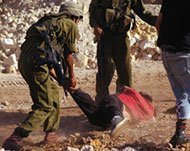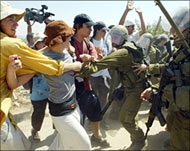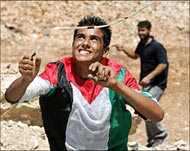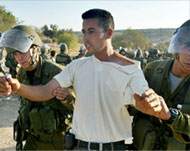‘We will lose our land if we stay quiet’
Now that Israel has withdrawn settlers and security forces from the Gaza Strip, the focus has shifted to the West Bank, where Jewish settlement growth and a lengthening separation barrier continue to contribute to the annexation of Palestinian lands.

Bil’in, a small Palestinian farming village 4km east of the Green Line, is a West Bank community under threat. The planned route of the wall comes within four metres of the last house in Bil’in and is set to devour more than half of the village’s land, to “protect” the nearby colony of Modiin Illit, where many of the evacuated Gaza settlers will be relocated.
Since February, when Bil’in received military notice that its land would be confiscated, its 1600 residents have held over 50 nonviolent demonstrations that have become a model of solidarity and creativity throughout the West Bank.
Israeli forces have injured more than 350 Palestinians using a variety of experimental crowd-dispersal ammunition, many Palestinians have been detained and beaten and the village has been subjected to weekly military curfew.
The area commander of Israeli army, Tzachi Segev, has said that “the stronger the activity against the fence, the stronger our operations will be”.
Abdullah Abu Rahme is Bil’in’s community leader and a prominent member of the Bil’in chapter of the Popular Committee against the Wall and Settlements that organises the weekly demonstrations.
He has been beaten, arrested, interrogated and threatened in the middle of the night by Israeli forces, but he has vowed to continue to lead the nonviolent struggle against the wall and against settlement expansion.
Abu Rahme spoke to Aljazeera.net by phone from his Bil’in residence.
Aljazeera.net: Tell us about Bil’in.
Abdullah Abu Rahme: Bil’in is a small farming village that lies about 17km west of Ram Allah. Before the occupation of Palestine in 1948, Bil’in fell under al-Ramle’s municipality. We used to have 1700 residents. Most were farmers.
Israeli settlements were established in 1979 on part of our land. In 1991, a further 1300 dunams (321 acres) of agricultural land was confiscated by the state of Israel for the construction of the colony of Kiryat Sefer. Two hundred dunam of olive trees remained in Palestinian hands. They were subsequently sold through forgery in 2003.
How does the Israeli separation barrier affect your village?
Bil’in will lose an additional 1000 dunums (247 acres) behind the wall.
There are 4000 dunums (988 acres) of land in Bil’in. The settlements and the wall have confiscated 2300 (568 acres) dunums – more than half of them. Most of this land was used for planting olive trees and grazing fields for cattle.
This swathe of land lies between the two older settlements and the wall, which demonstrates that real purpose behind the wall – to annex the land and expand the settlements.
 |
|
Israeli soldiers remove a Jewish |
Two years ago, at the end of 2003, Israel began constructing a new colony – Mattit Yahu East – on our land, under the pretext of simply expanding an older one, called Mattit Yahu. It has no occupants yet and is just being built to confiscate more land. In addition there is a plan to build two new outposts on the remaining land.
They say there are “gates” that will allow us to enter our land, but at this rate, there will be no land left to access. They are destroying it by first isolating it, preventing us from accessing it, leaving it to dry, then claiming it as neglected property that reverts to the state, based on an old Ottoman law that says if the land is not taken care of for over 10 years it becomes the state’s property.
We are farmers and plant the land in the summer season, and we harvest in autumn. So in summer it looks like it is uncared for, and that is when they come and survey it. And this is the method by which they take our land. This is for land where wheat is planted. The olive trees are being encircled with the wall.
What is the economic impact on your village?
We depend on farming olives. It is our main source of income and living. Sixty per cent of villagers are farmers that depend on selling olive oil and olives. Their future is in peril.
Five to 10% depend on herding, and since part of the land that was taken by the wall was for cattle grazing, there is no chance for them to do this anymore, so they are being forced to sell their animals. The wall is destroying our village and our livelihoods. It is destroying an entire community.
There is also a sector of people who work as labourers inside Israel. They are allowed to enter freely, with their permits, but soon they will not be able to do this with the new system of gates.
From an economic perspective, this is a catastrophic situation. It will be very, very bad.
Then there is the demographic angle. We cannot expand. We can’t expand vertically because there are no foundations for this: the building are very old and there is no land left for horizontal expansion.
Where will the coming generations go to? They will be forced to migrate to Ram Allah or outside of Palestine. And both migrations are considered a modern and civilised form of transfer and expulsion. It is done in a discreet, seemingly unintentional way.
The Israeli High Court ruled on 15 September that part of the separation barrier has imposed major hardships on a group of Palestinian villages and must be rerouted. Was your village included in the ruling?
The decision was positive in that it will change the route of wall that affects some of the villages adversely, but unfortunately that does not include Bil’in. I was also informed that the High Court’s decision further says that in the future the court will deal with each appeal on a case-by-case basis, depending on its circumstances, and will take “security” into consideration.
So the case will not necessarily set a precedent for badly affected areas like us.
Have you attempted to file your own case in the High Court against the wall’s encroachment on your land?
We filed an appeal against the route of the wall in Bil’in, and it was approved and we are awaiting a hearing.
We were told that our case is tied to the decision of the villages around the settlement of Alfei Menashe, on which the High Court recently ruled. We feel there is a ray of hope and from it we will proceed with our case.
We are basing our case on the fact that the wall is built far away from the nearby settlements that it is supposed to protect – even though it is supposedly a security barrier.
 |
|
Foreign protesters clash with |
So the argument would be that it is being built not to protect the current settlements, but to annex land for the settlements that are planned for the future, while settlements are being vacated in Gaza and the northern West Bank.
Israeli officials say the wall serves security interests – that it prevents suicide bombers.
It is very clear from anyone who visits our village that they have used this as a justification and means to annex a large part of the land of the West Bank and Palestine.
In reality, we have seen areas where the wall was built that does not prevent bombers, and other areas where nothing happens and there is no wall. It’s not a matter of security but of stealing land, taking as much land as possible from the West Bank and eliminating any possibility of creating a Palestinian state in the future. It is a cancer that kills any dream in Palestine.
Every week you lead nonviolent, creative protests against the wall. Tell us about them.
We try to create a new theme for each of our demonstrations because we realise that this struggle will last a long time.
Persistence requires innovation. Doing the same thing every time leads to boredom for those who cover it – and I mean the media. I am sure that as a media person you know this – where there is something new, you will go after it.
If we have a protest, and someone is hurt, or seven people die, week after week, soon it becomes the same old news. So innovation makes it fresh news for the journalists.
At first we began somewhat spontaneously – in February of this year when we learned our land was being threatened. Then the demonstrations became organised and planned.
The idea was to send the message to Palestine, to the Israeli army and to the entire world that there is a small village called Bil’in whose very existence is at stake and who will not stay quiet about it.
Which demonstration stands out most in your mind?
The first memorable thing that we did that got the attention of the media, the army and the world was to tie ourselves to our olive trees to coincide with beginning of the work of the bulldozers. We were inspired to continue on this path of innovative, nonviolent resistance.
An Israeli army officer came and told me that “tomorrow we are uprooting your olive trees, tell villagers to choose a location to replant them in”. According to Israeli law, the olive trees that are uprooted in the way of the wall must be replanted somewhere else. But we refused. What do we want with olive trees if our land is being taken from us?
We thought hard about what to do. It took a long time.
 |
|
Palestinians in Bil’in throwing |
We made a decision at 10pm that night to tie ourselves to the olive trees before the bulldozers came. We bought the chains and locks from Ram Allah; we drew up posters; We also realised we needed someone to protect us – they could hit us, shoot us, kill us.
So we called the media.
We got out early and tied ourselves to the trees, and tried not to be conspicuous so the army wouldn’t get suspicious early. At 6am when the army came, they were absolutely shocked. They didn’t know what to do or how to react, so they called their commanders, one by one they came down.
The media was covering the event live.
The army finally reached a decision to cut the chains and detain the foreign and Israeli activists in a very violent way. These were unforgettable moments, and based on them we began our weekly demonstrations.
In the weeks that followed, we crawled into barrels and put ourselves in the way of the bulldozers; we carried mock coffins and gravestones to symbolise the death of our village; we locked ourselves in large cages; we put ourselves under mock guillotines in the path of the wall, and in one our more effective tactics, we held up mirrors in the face of the soldiers to show them how they appear to us.
What did you do this week?
We brought huge speakers to the roof of my house – because we were under curfew – and the Jewish pianist Jacob Allegro Wegloop, a Holocaust survivor, was invited to perform a variety of music, including the Palestinian national anthem.
He said: “I came in solidarity with villagers of Bil’in who are subject to the same subjugation that we faced.”
Children sang along in the streets and from the rooftops. American protest folk singer David Rovics performed also.
After Friday prayers, Palestinians and Israeli and international activists, including David Rovics, filled the streets with song and protest. Over 50 other Israeli activists were not allowed to enter Bil’in because the area was declared a closed military zone.
A clash between military forces and Palestinians broke out. Eleven people were wounded by rubber bullets, including a reporter, two children and two elderly people.
What is the role of foreign and Israeli activists in all this?
We heard about them through other committees who had similar experiences, and when our village first began to be threatened, sought their help. It started with one or two people and increased to several dozen supporters.
 |
|
The idea is ‘to tell the world that |
Their presence is very important. When Palestinians are detained, they try to free them and try to protect them from being detained in the first place. Also, with their presence in demonstrations, along with large numbers of Israelis, it becomes very difficult for the Israeli army to shoot live ammunition at us.
Essentially, they serve as guardians. They bring video cameras with them to monitor what’s going on. So in a situation where someone is detained and an Israeli soldier lies and accuses that person of assaulting him or throwing stones at him, the cameras can prove them wrong. This has helped us more than once.
Don’t you ever feel you are fighting a losing battle?
We will lose much more if we stay quiet. We will lose our land, our livelihood, and our community.
And history will not be merciful to us. Our children will blame us, and ask us, Where were you and what did you do to try and stop this? We cannot lose more than what we as a Palestinian people have already lost.
I see a glimmer of hope that drives me to persist and it is planted in all my colleagues and villagers and supporters.
As long as you continue to demand you rights, you will never lose them. Even if the wall is built around Bil’in, we have plans to continue our demonstrations, in the same way and same spirit.
Even though it has taken us this long, and the year is almost over and construction on the wall is almost complete, we will persevere, we will cling to this hope, and continue on the same path of non-violent resistance. Because it will be a huge accomplishment for us if the wall is removed or at least moved back.